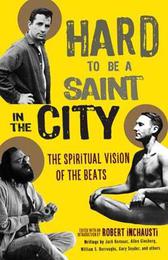
|
Hard to Be a Saint in the City: The Spiritual Vision of the Beats
Paperback / softback
Main Details
| Title |
Hard to Be a Saint in the City: The Spiritual Vision of the Beats
|
| Authors and Contributors |
By (author) Robert Inchausti
|
| Physical Properties |
| Format:Paperback / softback | | Pages:208 | | Dimensions(mm): Height 216,Width 140 |
|
| Category/Genre | Language - reference and general
Literature - history and criticism |
|---|
| ISBN/Barcode |
9781611804171
|
| Classifications | Dewey:818.5409 |
|---|
| Audience | |
|---|
|
Publishing Details |
| Publisher |
Shambhala Publications Inc
|
| Imprint |
Shambhala Publications Inc
|
| Publication Date |
30 January 2018 |
| Publication Country |
United States
|
Description
An exploration of Beat spirituality--seen through excerpts from the writings of the seminal writers of Beat Generation themselves. An exploration of Beat spirituality--seen through excerpts from the writings of the seminal writers of Beat Generation themselves. It's been said that Jack Kerouac made it cool to be a thinking person seeking a spiritual experience. And there is no doubt that the writers he knew and inspired-iconic figures like Allen Ginsberg, William S. Burroughs, Gary Snyder, and Michael McClure-were thinkers seeking exactly that. In this re-claiming of their vision, Robert Inchausti explores the Beat canon to reveal that the movement was at heart a spiritual one. It goes deeper than the Buddhism with which many of the key figures became identified. It's about their shared perception of an existence in which the Divine reveals itself in the ordinary. Theirs is a spirituality where real life triumphs over airy ideals and personal authenticity becomes both the content and the vehicle for a kind of refurbished American Transcendentalism.
Author Biography
ROBERT INCHAUSTI, PhD, is a professor of English at Cal Poly, San Luis Obispo, and is the author of numerous books, includingSubversive Orthodoxy,Thomas Merton's American Prophecy,The Spitwad Sutras, andBreaking the Cultural Trance. He is, among other things, a Thomas Merton authority, and editor of the Merton booksEchoing Silence,Seeds, andThe Pocket Thomas Merton. He's a lover of the literature of those who challenge the status quo in various ways, thus, he has had a lifelong fascination with the Beats.
Reviews"In Hard to be a Saint in the City, the rigorous and dynamic Robert Inchausti threads the singular voices of the beat generation into an inspired ensemble of edited voices that lifts up insight after insight. As a whole, their depth and innovation speak to the strength and tear of American life and, even more, to the enduring proposition, held in the chapter title, that "The Universe is the Messiah." This book offers a one-of-a-kind recording from the basement of America where spiritual riffs awakened our sudden connection to a timeless consciousness that gave rise to the sixties. More relevant than ever!"-Mark Nepo, author of The Book of Awakening and More Together Than Alone "Long ago a 'commonplace book' was a widely known and useful tool for preserving pithy statements and nuggets of wisdom. In the last century, this type of book virtually disappeared. However, Robert Inchausti has single-handedly revived the form with his new book Hard to Be a Saint in the City. The collection vibrates with quotations by and about the writers of the Beat Generation and reveals their basic (and often overlooked) spiritual quests. You can read it from cover to cover or dip into it anywhere and you won't go away disappointed."-Bill Morgan, author of The Beat Atlas and The Beats Abroad: A Global Guide to the Beat Generation "A marvelous book. What better way to present the wild wisdom and beatitude of the Beats than by letting them speak for themselves in their own untamed voices? Here, Inchausti orchestrates those voices into a slowly unfolding revelation that feels symphonic in its scope and complexity."-David Hinton, author of Hunger Mountain and The Wilds of Poetry "Inchausti has compiled this treasury of excerpts from the luminary and the lesser figures of the generation in a way that explains the spiritual beliefs, motivations, and actualizations of the Beat Movement in their own words."-The Advocate
|